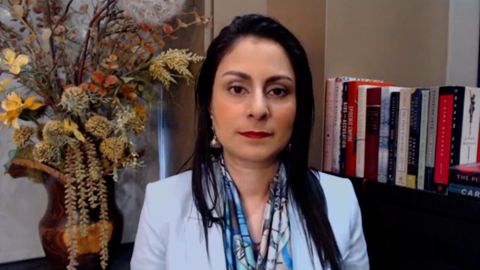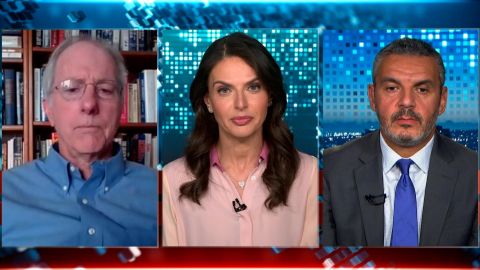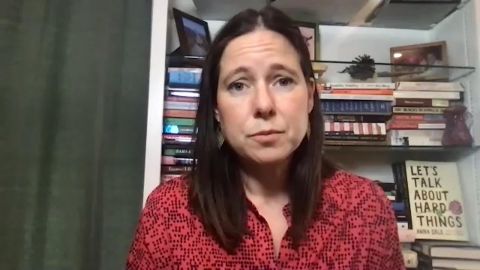Read Transcript EXPAND
BIANNA GOLODRYGA: Well, now, during the pandemic, many of us have had to wrestle with big emotions like grief and issues surrounding finances and
relationships. Well, our next guest, Anna Sale, explores these difficult topics on her interview podcast, “Death, Sex, and Money.” Her new book,
“Let’s Talk About Hard Things” is based on what she’s learned from these conversations. And here she is sharing those lessons from our Hari
Sreenivasan.
(BEGIN VIDEO CLIP)
HARI SREENIVASAN: Thanks, Bianna. Anna Sale, thanks for joining us.
As we’re all coming out of this horrible year and a half, and we’ve got almost 600,000 Americans dead, death is a topic that is in households, in
families today. While it’s universal, why is it so difficult for us to talk about it?
ANNA SALE, AUTHOR, LET’S TALKS ABOUT HARD THINGS”: Oh, I think because we want to be able to fix it with words. We want to be able to — if we’re
talking to someone who is in deep grief, we want to be able to offer words that will lift the sting of loss and we can’t. We can’t undo that loss.
So, what I really urge people to do in the book is to think about, what are the ways you can offer care and comfort by just joining them where they are
and validating wherever they are, however they’re feeling about a loss, you can feel a lot of things when you’re feeling grief, not just sadness, but
also anger, you know, helplessness, and just saying, I’m so sorry this happened, and showing that person that you will be with them while they
move through that grief.
SREENIVASAN: You recall a painful story of a friend who lost a baby that died late in the pregnancy. And what do you do when there’s no right thing
you can say? I mean, who prepares us for comforting someone in that kind of situation?
SALE: I think there have been institutions and conventions and sort of ways of being that have prepared us through generations. And part of what I
explore in the book is how a lot of that has fallen away or become less pronounced in American society.
So, actually, if you feel more of a burden on your own shoulders, as an individual to figure out how to have these conversations, you’re not making
it up, you know. And if you felt it before COVID, certainly you feel it more now, where we couldn’t even gather and hug and comfort physically in
the same way. We had to use words.
But I remember that feeling of helplessness, when my friend called me and said, my pregnancy — my baby has died. I had to deliver this baby that
isn’t alive. And all I feel is sadness and so wanting to lift that pain from her and knowing that I couldn’t.
And so, what I tried to do instead is to listen, to see what she needed to share and then to stay in touch with her and to be a person where she knew
she could talk about it, because it didn’t go away. It hasn’t gone away. This was years ago and she still celebrates her baby’s birthday, which was
also his death day, every year.
And she decided that she was going to be quite open about this loss, because she needed to be. And she’s found that a lot of other families have
sought her out when they go through that kind of private loss. You know, it can be hard to figure out where to go, because we don’t gather for funerals
in the same kind of way with pregnancy loss. And she’s accompanied other families through those layers of grief.
SREENIVASAN: What made you want to write a book? I mean, you also added family and identity along with sex, money, and death, but why now?
SALE: I kind of felt like — you know, I’ve been doing interviews with people about personal topics for a long time. And part of what happens on
my show that’s really special is people share things that they haven’t before. And people would ask me, like, what is it about the way that you
talk about these things that makes people open up? And I hadn’t really paused to figure out what was happening in those conversations.
What is the quality of an exchange that feels safe or open or curious that allows people to be vulnerable with me, a stranger, as an interviewer? And
then I also wanted to think about, how do I do this so well at work, and not so well, you know, in conversations with my spouse or family members or
friends when there’s conflict or hard things? You know, I also have that impulse to want to fix and just sort of paper over what feels tough.
So, I wanted to spend some time with creating a book that both gave you a sense of, here’s where to start, here’s some very simple tips about —
thinking about how you listen and signal that you want to have a different kind of conversation with someone in your life.
And then I also wanted to have a series of stories, not just from my life, but also from other people that I include so that you could be comforted by
all the ways that these hard things have shown up in other people’s lives, because I think what makes challenging hard things in our lives feel so
painful is that they can feel really isolating and alienating, and you can feel like you’re the only one and don’t know how to reach out for help.
SREENIVASAN: In the chapter on sex, you’ve talked to a sex worker and he says, every type of sex is a transaction. So, you have to be clear in terms
each time. And he has a relatively simple question. What are you into? That is almost like a philosophy lesson that comes from that.
SALE: Yes. I really actually love this deep life lesson came to me from a gay sex worker who has all kinds of interactions with people. And when he
described sex as a transaction, I was like, oh, that sounds very cold and not romantic and, you know, the kind of connection that can happen.
But I think what he is saying there is like, when two people are deciding to be together, physically and to share that with each other, one — you
are giving something to the other person. And sometimes, you know, you may be after the same thing. You know, you might want to be after a long-term
relationship and marriage and family and a very — that sort of image together.
And sometimes, you know, you might want — one of you might be just out of a breakup and looking for a distraction. And the other of you might just,
you know, be someone who enjoys being single and meeting new people. And when we don’t talk about what we’re looking for each — from the other,
that’s where a lot of miscommunication, pain, can happen.
So, with that question, what are you into, you know, it’s a prompt to first get clear for yourself, like, hmm, what do I need and want right now in a
romantic encounter? Like, what am I after? And also, to remind yourself that you need to ask the person that you are doing this with, like, what
are you up for, what are you into? Like to see if it matches up.
SREENIVASAN: In the chapters about money, there’s a line in there that says, money is like oxygen, it surrounds us, flowing in and out of our
lives, and when you’re short of it, nothing else matters.
And during this past year, I think, collectively, we have engaged in more conversations about money because of large-scale unemployment that happened
or realizing what’s an essential worker and what are they worth and the type of work that they’re doing and how they’re being rewarded versus, I’m
a white-collar worker and I could stay at home and I can still function, right? But what is it about money that is so off-putting to have
conversations about?
SALE: Oh, well, I think it’s, for one, when we say we’re talking about money, we’re talking about all of these things, all at once, you know?
We’re talking about our individual choices about spending and saving, you know, either your personal choices around money. That’s one thing.
You’re also talking about whatever cultural values you have around money and about interdependence versus being strong on your own and independence.
You’re also talking about, you know, how you feel like you stack up next to your neighbors. If you feel like you have more than you’ve earned or not
enough, compared to the people around you.
So, there’s a lot of, you know, for as much as we talk about inequality and difference when it comes to money in America, we also like to — you know,
you can look at polls and you can see, even as the share of the middle class has gotten smaller, people’s — like, they still identify as middle
class in high numbers. We still want to feel like we’re part of some collective middle. So, acknowledging difference can feel quite awkward.
SREENIVASAN: You also spoke to — in this, for this chapter, one of the cofounders of Facebook, Chris Hughes, who is wealthy by all of our
imaginations. Why was that conversation important?
SALE: Well, I was really curious because he’s someone who admits that like he has a lot more money in his bank account than he has earned with effort.
You know, he happened to be one of the cofounders of Facebook, which meant when that took off, he won big.
So, he talks a lot about this winner-take-all economy is what he calls it. And he’s used some of his wealth to create a critique of how that’s working
in our economy. And looked at things like universal basic income, for example, as a way to look at addressing some inequality in our country.
And as he’s doing that, he’s having to admit, what I have is the result of a system that I think we ought to change. So, I wanted to know, how do you
sit with that? You know, how do you sit with knowing this incredible wealth and fortune that you have is the result of a system that you think should
be tweaked? And what is it like when you try to talk about that openly, you know?
And so, there’s a political piece to what he talks about. I’m talking about this, because if I don’t talk about it, we’re not being honest about how
our system is actually working. But he also talked about the personal aspect that makes it icky and weird.
Like, it’s — he walks into a room and he’s aware that most everyone knows that he’s the richest guy in the room and he still wants to feel belonging,
you know, social belonging. So, how do you, at once, acknowledge that you are, yes, the wealthiest guy in the room, and here’s why, and still have
functional social interactions.
So, I wanted to talk with him about that. And it’s not something that’s simple. It’s not something he can explain away and say the right thing and
all of a sudden everybody’s going to just treat him like one of the guys, you know, because money is consequential. These differences exist. But I
just want to applaud him for trying, for saying, I’m not just going to like pretend like that this wealth that I have — I’m not going to not
acknowledge it, because it is hugely consequential.
SREENIVASAN: You have a chapter on family and there’s a couple of characters that you speak with, Pam and George who are probably like so
many other people in the United States right now who find themselves at absolute political odds, but what was it between them that we can model?
SALE: Yes. I loved their story, because George is an older gentleman, he’s a retired tool and dime maker in Michigan who supported Trump and his
stepdaughter lives in San Francisco and identifies as a political liberal and absolutely did not support Trump.
And in 2016, they found themselves all of a sudden spending a lot more time together because Pam’s mother, George’s wife, developed dementia. And so,
they were both wanting to be with her and now, spending a lot more time together. And what was critical there was they knew that this was a powder
keg. You know, this could have gone really wrong and destroyed their relationship if they had talked about politics without thinking about how
it happened. And they both made an effort.
You know, George, when Pam first cape to his house, Pam noticed, he used to always have Fox News on in the house all the time and she noticed that he
would turn it off when she was in the house, which just felt like an accommodation that was welcoming, you know. And Pam joked, they just
watched a lot of “Family Feud.”
And finally, they started — they were watching a debate together, this was during the 2016 election and Pam described them sitting on the couch
together. And finally, they looked together and laughed about 30 minutes in because they realized both of them had been so nervous, neither had made a
sound, you know, for first 30 minutes. And when they laughed, George said to Pam, he said, you know, I just want you to know, our relationship is
more important to me than politics. And Pam said, I agree.
And what that sentence indicated was, I’m going to take care of how I talk to you, I want to make sure we have a connection, and I’m not going to
start railing about politics in a way that I know is going to make you feel, you know, angry, rejected or want to debate me and be destructive.
And once they established that, what was interesting was they started to be able to talk about politics. And they would talk about it, but with a
spirit of curiosity more than trying to win a debate.
SREENIVASAN: Political identity seems so important, but you have a whole section that just looks at all the different ways that we’re comprised of
so many multiple identities, whether it’s linguistic or cultural or racial or like gender or geography, right? I mean, and we have this instinctive
defensiveness when any of those feels attacked, which makes a hard conversation just kind of shut down from the get go.
SALE: Yes. I wanted to lift up that how you are oriented in a conversation about identity really is something to pay attention to. For example, if
you’re talking to someone who is different than you, who might have a really different experience of feeling belonging in certain spaces. Like,
as an example, you know, I’m a white woman. In most of the newsrooms where I’ve worked, I’ve been surrounded by mostly white people. And what is it
like when I’m talking to a colleague who is a colleague of color?
You know, I was sort of taught growing up that the way to be good in talking about identity was to kind of immediately try to empathize and
express our common, what we share in common, to kind of try to say like, yes, you know, I see you, you’re just like me, and I actually think that’s
the wrong impulse.
You know, part of what makes identity conversations tricky is that it’s about lingering in that difference and allowing someone else’s experience
on this earth, walking through our society, if it sounds very unfamiliar to you to say, oh, that’s different than me, but I want to hear more about
that. I can hear you without feeling like you’re attacking my own identity.
But what I wanted to underline there is there’s a difference then in the imperative of listening. Like, both parties, in a conversation around
difference around identity ought to listen to one another. But for someone for whom it’s with more power, who feels more belonging, you know, more in
their daily lives, the imperative is to do more listening.
To really understand, because they’re describing an experience that is unfamiliar to you, unfamiliar to me, for example. And I need to sit with
that idea that I can’t intuit what it is like for them to move through American society. I need to hear and listen and incorporate that into the
complicated way I understand our society working.
SREENIVASAN: Anna Sale, host of the podcast “Death, Sex, and Money” and also author of “Let’s Talk About Hard Things,” thanks so much.
SALE: Thank you, Hari.
About This Episode EXPAND
Dennis Ross; Khaled Elgindy; Safwat al-Kahlout; Dr. Céline Gounder; Anna Sale
LEARN MORE



